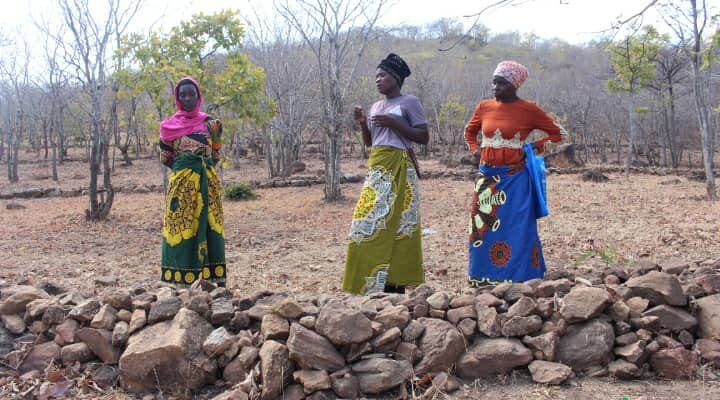
Community leaders in Mangochi hailed USAID funded Titukulane Project for building communities’ capacity in dealing with effects of climate change that also ignites food insecurity and ultra-poverty at household level.
Sub Traditional Authority Nkata hailed Emmanuel International and Care for implementing Resilience Food Security Activities (RFSA) in Jalasi area where communities participate in digging and constructing structures that are meant to properly manage water flow.
Speaking when Mangochi based team of journalist travelled to Ninje hills within Ntuluko Watershed area on a media tour to appreciate community participation in climate smart agriculture, Nkata anticipated best results in food security and improved livelihood.
Sub Chief Nkata said she was impressed with how her subjects adopted flood prevention and control structures in Ninje Hills plus swalles in people’s gardens which she said we’re enough to keep moisture for better yield.
The Titukulane Project under Food Security Activity engages 200 females and 100 males from ultra-poor households in cash for work.
After digging deep trenches and swalles constructing stone bunds, check dams and raising seedlings and participating in irrigation for 20 days the participants earn K1,200 translating to almost K24,000.
“This was women economic empowerment at its best,” added Sub Chief Nkata.
The Titukulane project is currently implementing Watershed management in six traditional authorities among them; Jalasi, Chowe and Chiunda to reduce food insecurity risks and increase resilience among the ultra-poor households.
Sungusya Watershed Committees secretary, Amisa Chindamba, from Traditional Authority Chowe said the water flow controlling structures at Ninje hills and swalles that are dug in gardens are a sure way of contributing to high crop production.
With other complimentary modern farming practices and manure application, Amisa said most farmers were looking forward to high maize yield this agricultural season.
“We’re anticipating high maize production this season after adopting new ways of doing things in our gardens,” she added.
The cash for work at Sungusya watershed management area engages 233 females and 67 males in tree regeneration, irrigation farming, digging deep trenches, swalles and construction of check dams.
Director of Agriculture Natural Resources and Environment for Mangochi District Council, Enford Kanyimbo commended the Titukulane project for complimenting government efforts in promoting climate smart agriculture apart from improving income levels of the ultra-poor households.
He also expressed hope that the participating farmers will continue to practice climate smart agriculture to sustainably manage natural resources within their localities.
Emmanuel International’s Monitoring and Evaluation Technical Coordinator for Titukulane project, Precious Mwanza said the project is being implemented in line with the National Resilience Strategy.
He said it was impressive to note that participating farming households have adopted best agricultural and environmental management practices to address food and nutrition insecurity.
“We’re satisfied with the how participants are adopting to the good practices that are meant to achieve food security and improve economic livelihood,” he said.
In Mangochi, Care and Emmanuel International are implementing Titukulane project in Nine Traditional Authorities namely; Nankumba, Ntonda, Chilipa, Chiunda, Chowe, Jalasi, Katuli, Bwananyambi and Namavi.
With funding from USAID, Care, Emmanuel International, Save the Children, Water Aid, NASFAM and International Food Policy Research Institute are implementing the Titukulane Project as consortium in Mangochi and Zomba for five years since 2019.
Follow us on Twitter:














